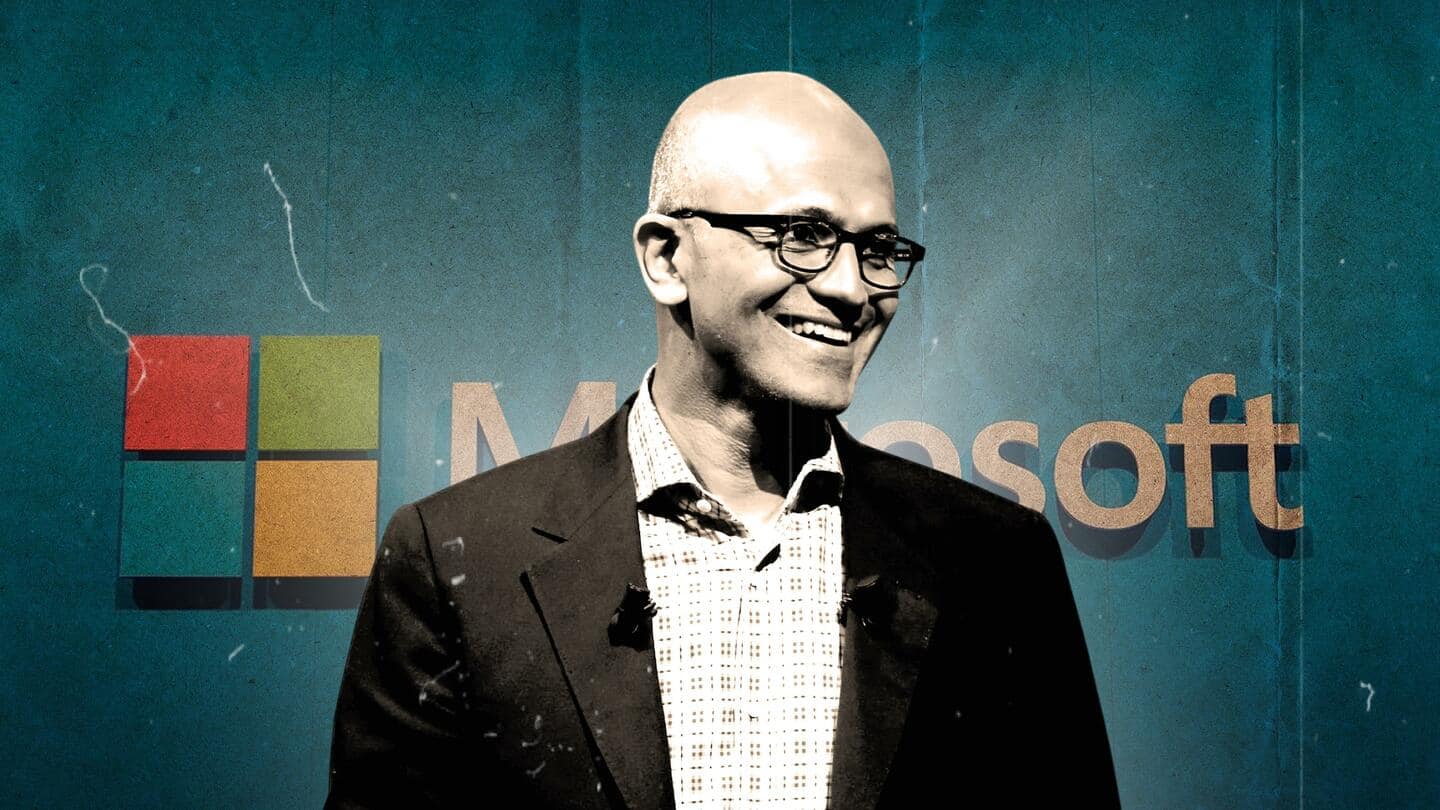
#NewsBytesExplainer: How Satya Nadella brought Microsoft back from irrelevancy
What's the story
Microsoft was seen as a relic of the past when Satya Nadella took charge as CEO in 2014. It had missed every significant tech innovation in the past decade and was battling a complacent and political work culture at that time. The company's fortunes have reversed since then. Here, we take a look at how Microsoft transformed under Nadella's stewardship.
Refresh and revive
Every organization has to hit refresh at some point: Nadella
Nadella's vision for Microsoft when he became CEO is perfectly encapsulated in his 2017 memoir Hit Refresh: The Quest to Rediscover Microsoft's Soul and Imagine a Better Future for Everyone. "Every person, organization, and even society reaches a point at which they owe it to themselves to hit refresh - to reenergize, renew, and rethink their purpose." And that's what he did.
Culture
Teams in Microsoft were warring factions before Nadella's time
A cartoonist once illustrated Microsoft's organizational chart. In the picture, there were three warring factions vying for superiority in the company. This wasn't an exaggeration of things. Under Bill Gates and Steve Ballmer (especially Ballmer), the teams were warring factions and executives promoted a star culture. The company displayed a similar cutthroat attitude toward its competitors as well.
Nadella's thoughts
Nadella wanted to move Microsoft away from internal politics
In his memoir, Nadella spoke about Microsoft's cutthroat culture before him. "Innovation was being replaced by bureaucracy. Teamwork was being replaced by internal politics. We were falling behind." He wrote that he was bothered by the cartoon. However, what bothered him the most was how the people at Microsoft accepted that. Nadella tried to change this by making the company more collaborative and customer-centric.
Vision
People should be 'learn-it-alls' more than 'know-it-alls'
Nadella's conversation with former Volkswagen CEO Herbert Deiss gives us an insight into what he implemented. He spoke about how Microsoft's success made people 'know-it-alls'. "We needed to go from being the 'know-it-alls' to 'learn-it-alls," said Nadella. "So we're making that case for every day. How do we listen to customers? How do we come together as a company?"
Cloud
Cloud computing was an afterthought for Microsoft before Nadella
Microsoft's journey back from irrelevance was mainly aided by its cloud business. The company's commercial cloud business was not part of its key business when Nadella took charge as the CEO. At that time, it was classified as "other" sources of revenue. Fast forward to 2022, Microsoft Azure has become the only cloud computing service that can realistically challenge Amazon's cloud might.
Major shift
How did Microsoft's cloud credentials improve under Nadella?
In 2015, Nadella boldly predicted that the revenue from Microsoft's commercial cloud business would reach $20 billion by 2018. It was bold because the company's cloud business' revenue was only $6.3 billion at that time. Not only did Microsoft achieve that target earlier than Nadella predicted, but the revenue from cloud business has also become the company's main driver of growth.
Information
Over half of Microsoft's revenue is from cloud business
In the quarter that ended in September, Microsoft's revenue from cloud business was $25.7 billion, up by 24% year-over-year. The company's total revenue in that quarter was $50.1 billion, which means cloud business represents more than half of Microsoft's revenue now.
Acquisitions
Microsoft has acquired over 80 companies after Nadella took over
Microsoft was once known for its innovations. However, the company missed some of the major innovations of the last decade including smartphones, social media, internet search, and more. Ballmer played the catch-up game during most of his reign. Under Nadella, however, there is a marked change in Microsoft's acquisition strategy. The company has acquired over 80 companies since Nadella took over as CEO.
Major acquisitions
Microsoft's acquisition of LinkedIn has proved to be great bet
Most of Microsoft's acquisitions have been smaller companies to improve its AI, cloud, developer, and security offerings. However, it has made some major acquisitions as well. In 2016, the company acquired LinkedIn for $26.2 billion, announcing its social media arrival. Since then, LinkedIn has proved that the company's investment has paid off. The company acquired Nuance Communications in 2021 for $19.2 billion.
Information
Activision Blizzard acquisition will be Microsoft's biggest
Any discussion about Microsoft's acquisitions won't be complete without the company's impending Activision Blizzard acquisition. If it gets through the suit filed by FTC scot-free, it will be the company's biggest acquisition to date. The deal is valued at $68.7 billion.
Letting go
Nadella wisely sold Nokia soon after he took over Microsoft
Under Nadella, Microsoft hasn't shown any reservations about adapting to reality. That's what happened when the company decided to bid adieu to its ill-fated Nokia acquisition. The company sold it to HMD Global in 2016 for $350 million, far lesser than the $7.6 billion it wrote off after the failed experiment. Nadella was quick to realize that Microsoft's expertise doesn't lie in smartphones.
Open source
Microsoft has been open to open-source software under Nadella
Another marked change in Microsoft's business after Nadela took over as CEO has been its attitude toward open-source software. For a company of Microsoft's stature, it may have been difficult to adopt the open-source way a few years back. However, that has changed under Nadella. The decision to move Microsoft Edge from Microsoft's framework to Chromium wouldn't have happened if not for Nadella.
Latest
ChatGPT will be incorporated into Bing
Nadella believes that Microsoft won't be affected by the economic slowdown that has hit its tech peers. The reason, same as we laid out earlier - reinvent. The company invested in OpenAI, the parent of ChatGPT, in 2019. Now, The Information has reported that the company will incorporate ChatGPT into Bing. This new addition will help it challenge Google's search engine hegemony.